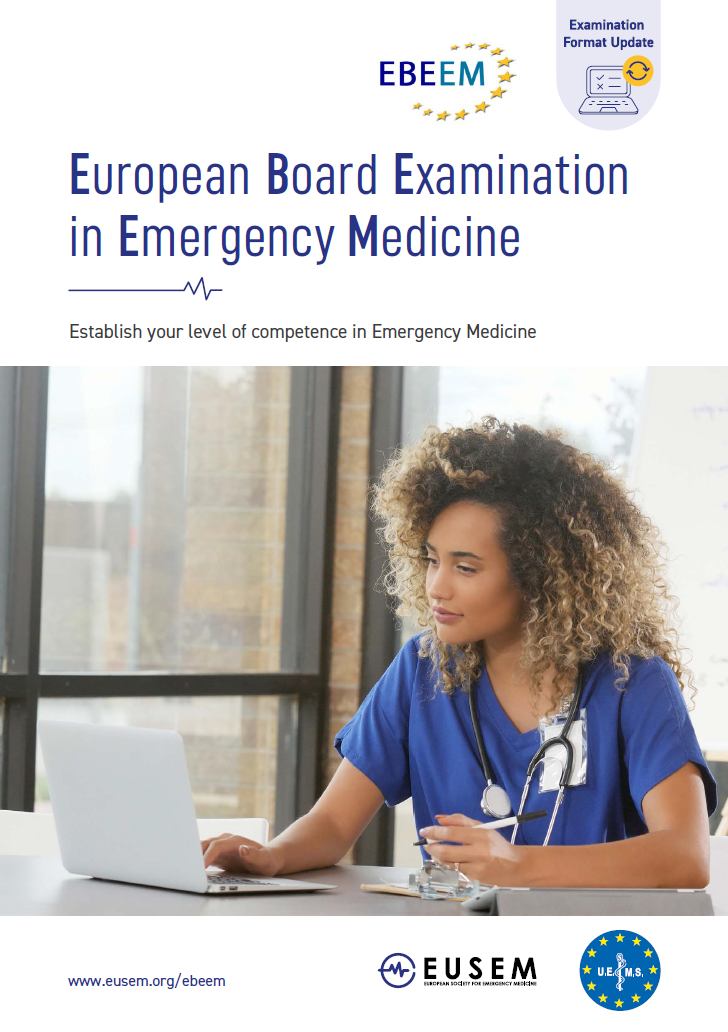What is the EBEEM?
The European Board Examination in Emergency Medicine (EBEEM) is a two-part examination that evaluates whether a candidate is eligible to practice independently as an emergency physician. It evaluates knowledge, skills, and behaviours needed for practicing Emergency Medicine, as described in the European Core Curriculum in the European Training Requirement (ETR) in Emergency Medicine.
The European Board Examination in Emergency Medicine (EBEEM) is developed and implemented by EMERGE (Emergency Medicine Examination Reference Group in Europe). EMERGE is a joint-committee of EUSEM and the UEMS Section of Emergency Medicine.
Why take the EBEEM?
The EBEEM exam is based on the European Training Requirements and the European Core Curriculum. As such, it is primarily meant for European physicians, but it has a global reach, and candidates are joining from all over the world.
Taking the EBEEM exam is an opportunity for Emergency specialists to:
- Recognise their skills and knowledge at the European level
- Enhance their competitiveness when applying for a position
- Boost their CV for local and international work opportunities
- Assess themselves and their training progress
Official Status of the EBEEM exam
The EBEEM exam is recognised and evaluated by the “Council of European Specialist Medical Assessment” (CESMA) who serves as an advisory body to the European Union of Medical Specialists (UEMS).
- The EBEEM exam is recognised as an official exit exam in the following countries:
- The full EBEEM exam, Part A and Part B, is the official exit exam of EM specialty training in Malta.
- The Part A exam is the official theoretical part of the exit exam of EM specialty training and supra specialty training in Flanders, Belgium.
- In the other European countries, the EBEEM exam is recognised as a post-graduate medical assessment.
The "UEMS-CESMA Guideline for the organisation of European postgraduate medical assessments" states:
-
- European postgraduate medical assessments are to be considered as a quality mark unless otherwise recognised by a national competent authority (NCA). Unless full NCA recognition has been obtained, the European postgraduate medical assessments will be considered complementary to the national examination.
- European postgraduate medical assessments will facilitate mobility of medical practitioners throughout the European Union (EU) by assessing specialist knowledge at an agreed EU standard. Furthermore, the European examinations will enable benchmarking of candidates against their European colleagues in other EU countries.
- However, passing a European postgraduate medical assessment will NOT imply a licence to practise. It is only the NCA that will be able to provide such a licence. Nevertheless, where full NCA recognition of a qualification applies, the European postgraduate medical assessments may provide a means for the NCA to determine eligibility for a licence to practise.
This statement is written by the members of EMERGE and designed to help Emergency Physicians in Europe to understand the importance and value of taking this specialist exam in Emergency Medicine. This is particularly relevant for countries where there is currently no exit exam at the end of training.
Success in the EBEEM does not confer a legal right to work as either a non-specialist (general medical registration) or specialist in any of the European countries (as you can see in the UEMS-CESMA guidelines). This is still dependent on the requirements of the national competent authorities.
Status of EBEEM AS AN OFFICIAL EXIT EXAM
The full EBEEM exam, Part A and Part B, is the official exit exam of EM specialty training in Malta.
The Part A exam is the official theoretical part of the exit exam of EM specialty training and supra specialty training in Flanders, Belgium.
Contact us
You can address your questions to: This email address is being protected from spambots. You need JavaScript enabled to view it.


